
Every member of your practice team can help increase security.

How do I know how much I need to save for retirement?

You can enhance your professional career every time you step up to the lectern—provided you've mastered the all-important basics of public speaking.

Find out what parting staff members really think about your practice-and use that information to make it a great place to work.

In July, the AVMA held a diversity symposium to address ongoing racial and gender issues impacting the veterinary profession.

A new federal rule requires you to properly dispose of sensitive information derived from credit reports. Effective June 1, The Fair and Accurate Credit Transactions Act disposal rule says you must burn, shred, pulverize, erase, or otherwise destroy electronic and hard-copy files you've obtained from a consumer-reporting company for employment reasons.

Prescribing the medicine is easier than taking it, but if you want to uphold your standard of care, you need to ditch your excuses.

The Pet Animal Welfare Statute of 2005, introduced in the Senate (S. 1139) and House of Representatives (H.R. 2669), is designed to strengthen the regulation of the pet industry.

Starting in October, it'll be harder for people to file for personal bankruptcy under Chapter 7, says Veterinary Economics Personal Finance Editor Fritz Wood, CPA, CFP. Under Chapter 7, debtors can wipe away unsecured debts such as credit card bills after certain assets are liquidated.

How do you know whether a newly hired team member is right for his or her job and, equally important, right for your practice? Many practice owners evaluate a new hire's job performance during a probationary period, which can last from 30 to 90 days.

Preanesthetic testing helps protect your patients' health--and decreases your practice's liability. Use this form to help educate clients.

In general, the right of confidentiality belongs to the client, and you can't release information about your client or the care of a patient until your client provides written authorization or waives that right, says Dr. John Scott, attorney.

How should I handle a chronically sick employee who calls in at the last minute or struggles to come in ill? I previously switched her from hourly- to salary-based pay, and I'm considering changing her back.

"Never practice without liability insurance," says Dr. Karl Salzsieder, JD, a Veterinary Economics Editorial Advisory Board member and a consultant in Kelso, Wash. "I know of one veterinarian who inadvertently let his insurance expire. Within two weeks, he had a suit that cost him $7,000 to settle."

I'm a full-time veterinarian, and my employer pays for my health insurance, which costs about $4,000 a year. I recently got married, and my husband's insurance is better. If I join my husband's policy, should I get that $4,000 benefit somewhere else in my package? Is it fair to ask my boss to add it to my salary or to add more paid vacation days in equivalent to the benefit money?

"It can be difficult for any practice to retain good employees," says Beth Montoya, hospital administrator at Pembroke Veterinary Clinic and Sajo Farm Veterinary Hospital in Virginia Beach, Va., and Great Bridge Veterinary Hospital in Chesapeake, Va. "But in areas with many strong veterinary hospitals, we have to work even harder."

Occasionally, even the best employee has a lapse in judgment. And lapses have consequences. For example, you may have reached into an empty tray of distemper vaccines on a busy Saturday, or found the practice shorthanded one afternoon.

The AVMA has released a white paper detailing its stance on using "guardian" to describe the pet owner's relationship to his or her pet.
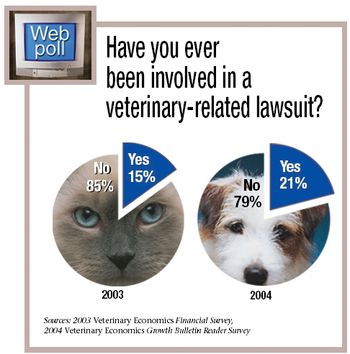
Under the Family and Medical Leave Act of 1993 (FMLA), you must treat maternity leave the same way you do any other temporary medical leave—if you meet the following FMLA requirements:

The greatest motivation you can offer is something new and challenging to complete. So give your team members jobs that are just beyond their comfort zone, and they'll enjoy a sense of accomplishment when they complete the difficult new task.

Law firm Childress Duffy Goldblatt is considering a class action lawsuit related to over-vaccination of pets.

Take a look at the issues team members say bother them most. Then think about what you could do to make their professional lives easier. They'll pay you back-promise! (Attention associates: Boss driving your crazy? We've got ideas for you, too.)
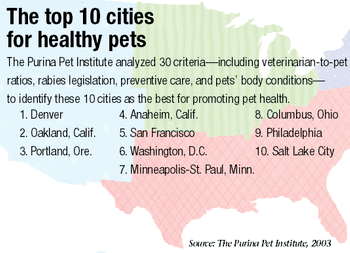
Where you choose to live affects your career opportunities, your personal happiness, and even the health of the patients you see. Does your city rank among the best?
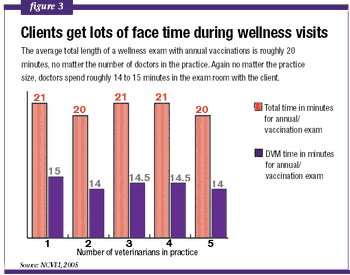
Data shows that if your clients arrive during a busy time, their average wait for check-in and check-out can hit 21 to 29 minutes during a 42- to 49-minute visit. That's almost half their time at the practice.
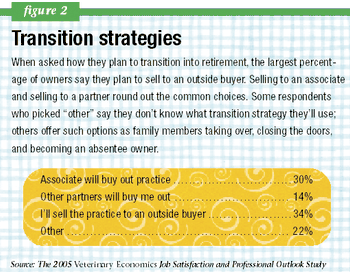
Step one: Weigh the benefits and decide whether you're interested in ownership. Step two: Start developing critical leadership skills.
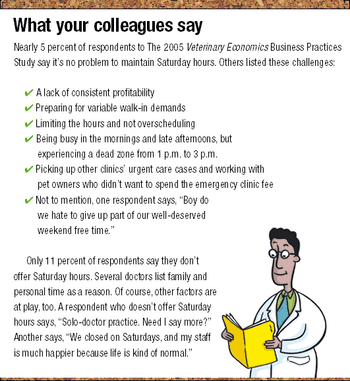
Almost 90 percent of you are are at work. Maybe it's time to buck the trend.

Data shows team members are in search of stronger leadership. So prevent kinks in teamwork and breaks in communication by taking these six critical steps—and set a positive tone for the practice.
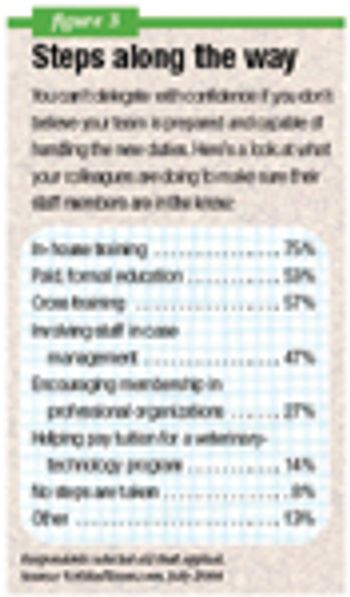
Yes, it can be hard to trust other people to manage the tasks you've been doing. But effective delegation makes for happier staff members who feel genuinely appreciated.
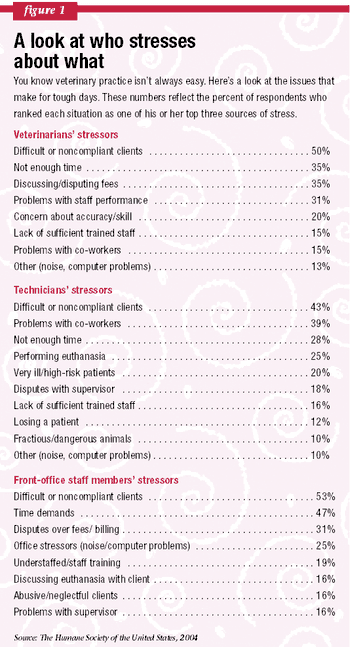
Nearly 30 percent of practitioners are at risk for compassion fatigue. Would you recognize the symptoms and know what to do?